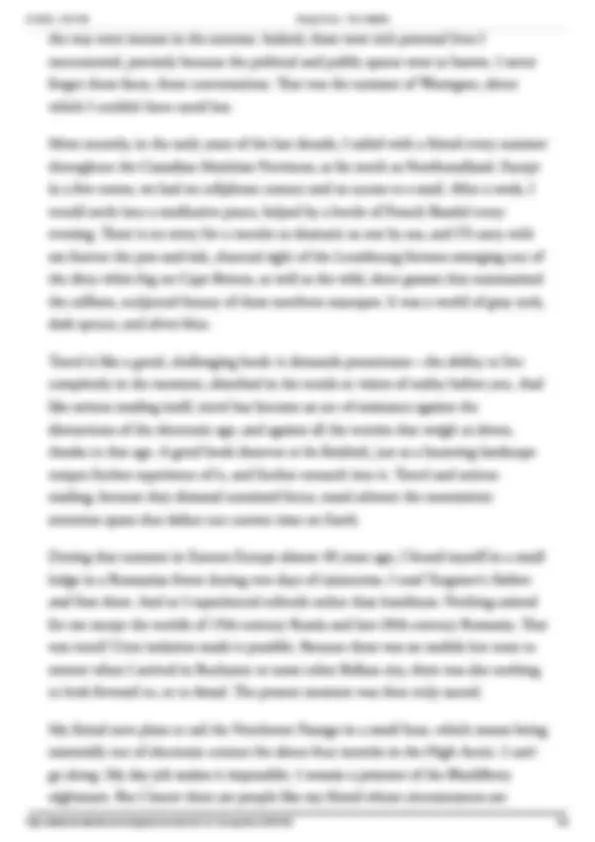




Study with the several resources on Docsity

Earn points by helping other students or get them with a premium plan


Prepare for your exams
Study with the several resources on Docsity

Earn points to download
Earn points by helping other students or get them with a premium plan
Community
Ask the community for help and clear up your study doubts
Discover the best universities in your country according to Docsity users
Free resources
Download our free guides on studying techniques, anxiety management strategies, and thesis advice from Docsity tutors
In this thought-provoking article from the atlantic, robert d. Kaplan reflects on how constant connectivity has diluted the experience of traveling to new places. He shares personal anecdotes from his early travels before the information age and contrasts them with the distractions and demands of modern-day communication. Kaplan argues that the intensity of the travel experience comes from total immersion in a place, free from external distractions.
What you will learn
Typology: Thesis
1 / 4

This page cannot be seen from the preview
Don't miss anything!



GLOBAL
By Robert D. Kaplan
In the Information Age, with constantmeans to experience someplace new. (Henry Lin/First Light/Corbis) connection to home and work, we've diluted what it
NOVEMBER 2012 ISSUE
- : I get off a 15-hour �ight from North America and turn on my BlackBerry at some Asian airport. Instead of focusing on the immediate environment and the ride into town, I am engrossed in the several dozen e-mails that piled up while I was en route, a third of which require a serious response, and one or two of which relay worrying news. As if that isn’t enough of a distraction: throughout all my journeys, because of the 12-hour time difference, each morning in Asia begins
Subscribe
SHARE
with a slew of e-mails from the East Coast, again requiring responses, again relaying crises to deal with. Wherever we are, we are all always available, and everybody knows it. e media tell us how lucky we are to live in the Information Age. I believe we have created a hell on Earth for ourselves.
Let me bore you with the old days: In the early 1980s, nobody had advance notice of my arrival anywhere. I’d �y to Addis Ababa to cover a famine, or to Sarajevo to cover the preparations for the Winter Olympics, armed with only about eight names and telephone numbers. Because I did not have to waste time sending e-mails back and forth for days to set up appointments, I had that much more time to read about the history and geography of the country to which I was headed. And you know what? When I arrived and dialed those numbers, about half the people on the list answered and were pleased to meet with me: after all, I had come all this way, completely dependent on their hospitality. And so hospitality was offered. And those people introduced me to other people. It was all so much more efficient then. Now, after corresponding for days with someone just to arrange a meeting, when you arrive at his office thousands of miles away, he answers some of your questions by referring you to a Web site.
I am not saying information is now harder to come by. I am saying the intensity of the experience of foreign places has been diluted. e real adventure of travel is mental. It is about total immersion in a place, because nobody from any other place can contact you. us your life is narrowed to what is immediately before your eyes, making the experience of it that much more vivid.
It isn’t just the landscapes that are overpowering, but the conversations, too. Real conversations require concentration, not texting on the side. e art of travel demands the end of multitasking. It demands the absence of bars on your smartphone when you are in a café with someone. at’s because travel is linear—it is about only one place or a singular perception at a time.
In 1973, upon graduating from college, I traveled for three months in Communist Eastern Europe. Not only could nobody from home contact me, there was no real news about the world in the English-language newspapers where I was (the International Herald Tribune was banned in many places or arrived days late). My interactions with the young East Germans, Poles, Hungarians, and others I met along
different, who will opt for authentic experience, who will resist. Only because of them, the art of travel lives on.
SARAH ZHANG
ANNE APPLEBAUM
SPENCER KORNHABER
JENNIFER SENIOR
DEREK THOMPSON
Robert D. Kaplan is a former contributing editor at e Atlantic and the author of In Europe’s Shadow: Two Cold Wars and a irty-Year Journey rough Romania and Beyond.